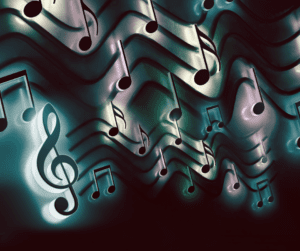
I was looking for the right word to describe where we want to get on our grief journeys. Hopefully most people now understand that the goal is not to “get over it” and “move on.” Some talk about “healing” our grief, but since grief isn’t an illness, the word healing doesn’t seem quite right. Arriving at a “resolution” has possibilities except that word usually means finding a solution to a problem or a puzzle. And grief, though it can be puzzling is not a problem to be solved.
Then I remembered music might have a suggestion for us. In western tonal music theory, the term “resolution” is the move of a note or chord from dissonance (an unstable sound) to a consonance (a more final or stable sounding one). That fits with grief, a journey from instability to stability. That got me thinking about what music offers our grief journeys, not just as a metaphor, but as a medicine. As with other arts, can it be a vehicle to take us into our grief, help us process it, and bring us out?
As what happens often when I set out on a path of discovery, the universe starts providing me resources. This very day I met with two women who have had music as a support system for their lives since childhood, and now find it useful in their life as elders. Rachel is a pianist whose mother and grandmother played classical music. I mentioned to her what I’d found out in my search about music, particularly what is known as the tension and release in music. This refers to the build-up of musical intensity that eventually dissolves and relaxes. A moment of unrest in the music creates an expectation for its resolution and an anticipation for the drama to resolve. Tension and release keep the music moving forward.
For me this tension and release connects with one of the newer theories on grief, the dual process model of grieving. This model, originating in the mid-90s by Margaret Stroebe and Henk Schut, sees the work of grieving as two-sided: the loss orientation where a person processes the loss through remembering, yearning, and reminiscing to let go of the relationship bonds, and restoration-oriented, which includes coping with secondary losses, and rebuilding a life after the loss. The main feature of this model is the notion that it’s healthy to oscillate between the two, experiencing grief in doses. This is where self-care comes in. Just as tension and releasing keeps the music moving forward, oscillation keeps the grief moving.
“As a kid, music understood me in a way that other people didn’t,” Rachel said. “It (the music) understood my deep grief and said to me, “walk on, walk on, anyway.” We talked about the message of reassurance in the chord resolution, which is when the chord progression brings it home, usually back to where it started. “Music takes you some wonderful places too. It is medicine.” Rachel declared. She suggested that I give myself an experience of both the Franck Symphony and Bach’s Second Movement of the First Brandenburg Concerto.
I did and I felt afterwards that I had been take somewhere and returned in a more relaxed state. Then she said something that definitely applies to both music and grief – “It stretches us so much that we are able to take in what follows in the third movement, the joy that floods in.”
Karen is a 60’s something woman living with and caring for her 96-year-old mother who is suffering with cognitive impairment and near blindness. Both of them, due to Covid and their health issues, have been quite isolated in the last few years. Being a member of a choir or chorus has been a central part of Karen’s social life since middle school, but Covid shut that down and she hasn’t found a replacement for that in her present life. “I sing in the car but it’s not the same, “she told me. Listening to music has been a stress reliever but she’s currently experimenting with toning as a way to “recalibrate” her energy level. That word caught my attention, and we looked it up– “to adjust the gradations or settings on a piece of precision equipment.” We both laughed when we agreed that our bodies, minds, and spirits are pieces of precision equipment, and music just might be a way to recalibrate our losses from the past and our expectations for our future lives.

